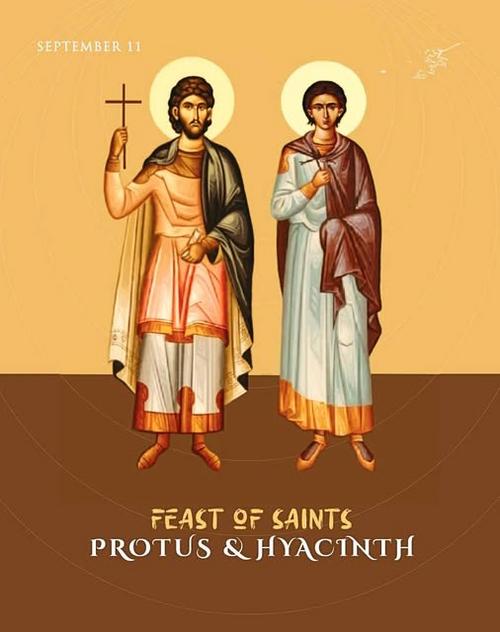
Faithful in All Circumstances: The Witness of Saints Protus and Hyacinth
In the early centuries of Christianity, when the Roman Empire was still grappling with this new faith, there lived two remarkable men whose names we remember today: Saints Protus and Hyacinth. These were not emperors or senators, not wealthy merchants or learned philosophers. They were slaves, owned by a Christian Roman woman named Eugenia, who was herself the daughter of a prefect.
What makes their story so compelling is not their social status, but their unwavering faithfulness to Christ despite their humble circumstances. As slaves in a Christian household, they witnessed firsthand how the Gospel transforms relationships. Under Eugenia's influence, they embraced the Christian faith with such devotion that when persecution arose under Emperor Valerian around 257 AD, they chose martyrdom rather than deny their Lord.
Their story challenges us to consider:
Does our faithfulness to Christ depend on our circumstances, or does it shine brightest when we find ourselves in positions of service and humility? These two saints discovered that true dignity comes not from worldly status, but from our identity as children of God.
Paul's Teaching on Christian Relationships
The New Testament provides clear guidance on how faith transforms all relationships, including those between masters and servants.
In Ephesians 6:5-9, Paul writes: "Bondservants, obey your earthly masters with fear and trembling, with a sincere heart, as you would Christ... Masters, do the same to them, and stop your threatening, knowing that he who is both their Master and yours is in heaven, and that there is no partiality with him."
Similarly, in Colossians 3:22-4:1, Paul emphasizes serving "heartily, as for the Lord and not for men" while calling masters to treat servants "justly and fairly." These passages reveal that Christianity transforms social structures from within by establishing mutual respect and accountability before God.
The Philemon Connection
The letter to Philemon provides a beautiful parallel to our saints' story. Paul writes about Onesimus, calling him "no longer as a bondservant but more than a bondservant, as a beloved brother" (Philemon 16). This transformation—from property to beloved brother—mirrors what we see in Eugenia's household.
Protus and Hyacinth were fellow believers, brothers in Christ, partners in the Gospel. The Gospel message is clear: in Christ, there is neither slave nor free, for we are all one in Christ Jesus.
Suffering with Purpose
First Peter 2:18-25 speaks directly to our saints' experience: "Servants, be subject to your masters with all respect... For this is a gracious thing, when, mindful of God, one endures sorrows while suffering unjustly." When persecution came, Protus and Hyacinth chose to stand firm in their own faith, even unto death.
Their patient endurance was not passive resignation, but active witness to Christ's transforming power. As Peter writes: "He himself bore our sins in his body on the tree, that we might die to sin and live to righteousness."
Finding Dignity in Service
What does their witness mean for us today? First, our dignity comes from our identity as God's children, not from job titles or social status. Second, those in authority must treat others with respect due to fellow image-bearers of God. Third, faithfulness in small things prepares us for faithfulness in great things.
Finally, the Gospel has power to transform any situation—no circumstance is too humble for God to use for His glory.

